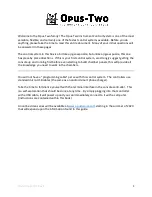
Series 2600B System SourceMeter® Instrument Reference Manual
Section 6: Instrument programming
2600BS-901-01 Rev. B / May 2013
6-13
Do not use top-level command names as variable names. If you do, you will lose access to all
commands that start with that name until the global variables are restored. For example, if you send
the command
digio = 5
, you lose access to the digio.* commands. To restore the commands listed
in the table (except
node
) and access to the digio.* commands, send the
restoreglobals
command or restart the instrument. The top-level command names are listed in the following table.
Top level command names
beeper
gcinfo
os
smub
bit
gettimezone
status
collectgarbage
gpib
printbuffer
string
dataqueue
io
printnumber
timer
delay
lan
reset
tonumber
digio
localnode
savebuffer
tostring
display
makegetter
script
trigger
errorqueue
makesetter
serial
tsplink
eventlog
math
settime
tspnet
exit
meminfo
settimezone
type
format
node
setup
userstring
fs
opc
smua
waitcomplete
Values and variable types
In Lua, you use variables to store values in the run-time environment for later use.
Lua is a dynamically-typed language; the type of the variable is determined by the value that is
assigned to the variable.
Variables in Lua are assumed to be global unless they are explicitly declared to be local. A global
variable is accessible by all commands. Global variables do not exist until they have been assigned a
value.
Содержание System SourceMeter 2601B
Страница 841: ......
















































